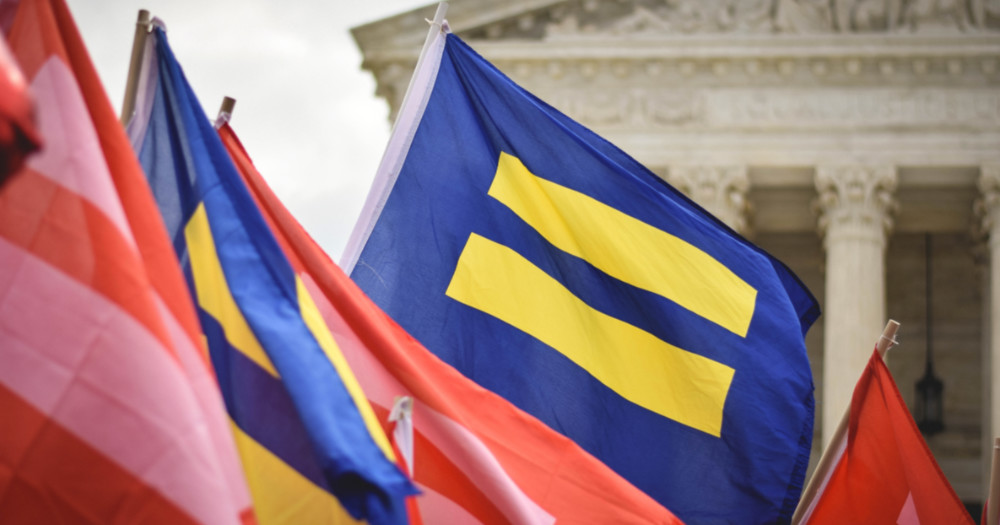Tuesday’s election has resulted in many firsts for the LGBTQ+ community; between the first transgender senator elected, first Black queer representatives elected, and now Nevada has become the first state to remove the same-sex marriage ban from its constitution, while Arizona is fighting for trans rights.
Residents of Nevada voted in favor of Question 2, which would remove an inactive same-sex marriage ban from the state constitution. The ban came from a 2002 amendment that defined marriage as between one man and one woman.
“Marriage would be defined as between couples, regardless of gender, though religious organisations and clergypersons would have the right to refuse to solemnise a marriage,” read Question 2.
The New York Times reports that 61.2% (691,661 voters) supported Question 2 over 38.8% (438,318 voters) against the amendment change, with 75% of votes reported.
“This overwhelming majority should be a reminder that LGBTQ equality is not just the right thing to do, it is exactly what Nevadans want,” said Briana Escamilla, Human Rights Campaign’s Nevada director.
Prior to Election Day, 30 states held provisions in their constitution that defined marriage as between one man and one woman. The Supreme Court case of Obergefell v. Hodges in 2015 brought same-sex marriage to every state across the US, overruling those restrictions.
With the Supreme Court now holding a 6-3 conservative majority, due to the appointing of Amy Coney Barrett, this measure made by Nevada voters ensures protection for same-sex couples no matter any potential moves made federally in the Supreme Court.
Meanwhile, Nevada’s neighbor, Arizona, is currently fighting against a discriminatory trans birth certificate policy. Laws in Arizona currently require that transgender people undergo surgery before the state will change the sex listed on their birth certificates. Now three trans youths in the state are challenging that rule in court.
The lawsuit, which was filed Wednesday in the US District Court for the District of Arizona, says that the plaintiffs need accurate birth certificates so that their privacy and safety can be protected. Attorneys argue that current guidelines would require the platinffs to disclose information about their trans identity that could cause significant emotional harm and place them at risk for discrimination, harassment and violence.
The requirements to correct the sex or gender designation listed on an individual’s birth certificate vary from state to state. Colorado allows the document to be updated based on the self-attestation of an adult, while changes for minors require sign-off from a medical or mental health professional.
Louisiana will only update the gender marker on a birth certificate with the issuance of a court order that certifies a gender change. Ohio and Tennessee, don’t allow trans people to change their birth records at all.
Only 24 states, along with the District of Columbia and Puerto Rico, allow trans people to update their birth certificates without requiring sex reassignment surgery or a court order.
Similar court challenges, like Arizona’s, have emerged in other states as well. In March, the state of New York passed a law that allows transgender minors born in the state to change the sex marker on their birth certificate without having to provide medical evidence. Meanwhile, an Idaho judge ruled in June that it is unlawful for the state to prevent trans people from correcting their birth certificates.
The fight for LGBTQ+ rights in Nevada and Arizona comes at a time when the whole world is watching them determine the outcome of the 2020 Presidential Election.
© 2020 GCN (Gay Community News). All rights reserved.
Support GCN
GCN is a free, vital resource for Ireland’s LGBTQ+ community since 1988.
GCN is a trading name of National LGBT Federation CLG, a registered charity - Charity Number: 20034580.
GCN relies on the generous support of the community and allies to sustain the crucial work that we do. Producing GCN is costly, and, in an industry which has been hugely impacted by rising costs, we need your support to help sustain and grow this vital resource.
Supporting GCN for as little as €1.99 per month will help us continue our work as Ireland’s free, independent LGBTQ+ media.
